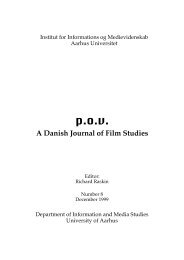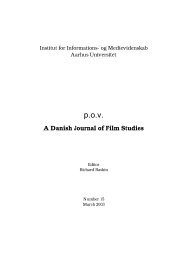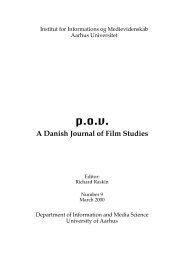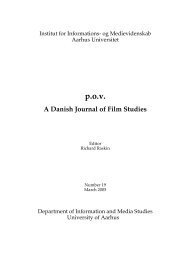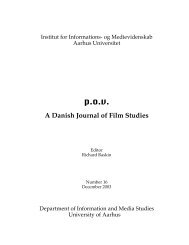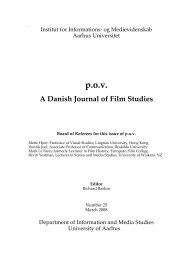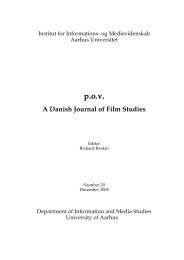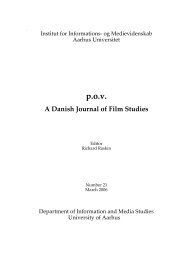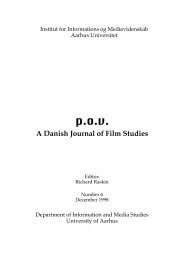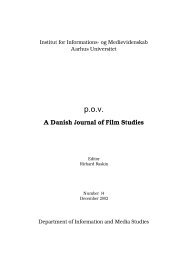The Face of Time - POV - Aarhus Universitet
The Face of Time - POV - Aarhus Universitet
The Face of Time - POV - Aarhus Universitet
You also want an ePaper? Increase the reach of your titles
YUMPU automatically turns print PDFs into web optimized ePapers that Google loves.
96 p.o.v. number 13 March 2002<br />
camera movement, however, intensifies the viewing process by<br />
creating an expectation that underlines the significance <strong>of</strong> the scene.<br />
But that is not all. <strong>The</strong> question that has been "asked" by the film<br />
so far has been a factual or a cognitive question, a question related<br />
to understanding and knowledge. <strong>The</strong> initial question ("What do the<br />
women see?") has led to other related questions like "What is this<br />
place?" and "What will happen next?" But the questions the hanging<br />
scene raises are questions <strong>of</strong> a different type. <strong>The</strong>y are questions<br />
about the motives and identity <strong>of</strong> the people seen. "Who are these<br />
people?", "Who are the hangmen and who are the victims?", "Why<br />
are they doing what they are doing?" Unlike the factual "what"<br />
questions, these new questions – they might be called "why"<br />
questions – remain unanswered. All we get to know is that people<br />
who seem to be peasants are hanging other people who also seem to<br />
be peasants. Why they are doing this is not told. <strong>The</strong>re are no clues,<br />
no emotional reactions that show how to relate to this horrific scene.<br />
Only a matter-<strong>of</strong>-fact process <strong>of</strong> hanging that takes place in silence.<br />
<strong>The</strong> shocking scene doesn't halt the camera. As the hanging goes<br />
on, the camera keeps on moving, indifferently, until it reaches its<br />
original position. This kind <strong>of</strong> detached approach doesn't, however,<br />
create an indifferent relation to what is happening. On the contrary,<br />
the emotional power <strong>of</strong> the scene only increases because it is not<br />
emphasized but only seen (literally) in passing.<br />
...becomes an enigma<br />
What happens in the film is thus a movement from a question <strong>of</strong><br />
factual understanding to a question that has no answer, to an openended<br />
question. At the end <strong>of</strong> the film we have the answer to our<br />
original question; we "know." But at the same time we do not really



